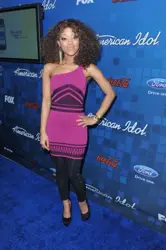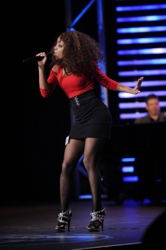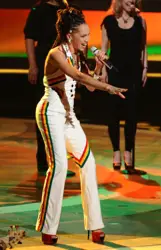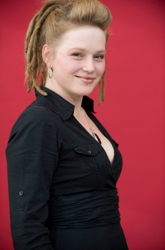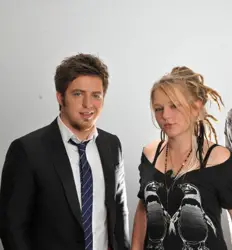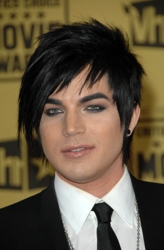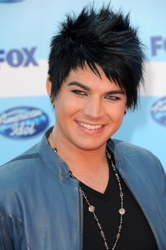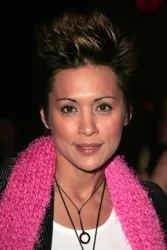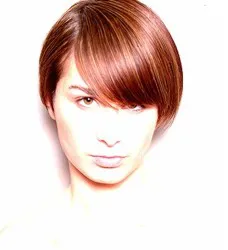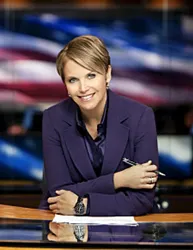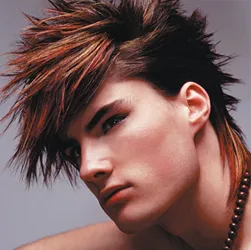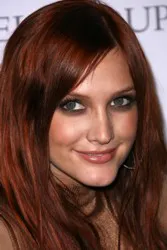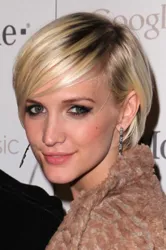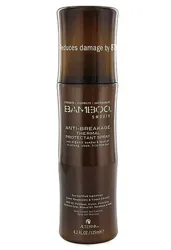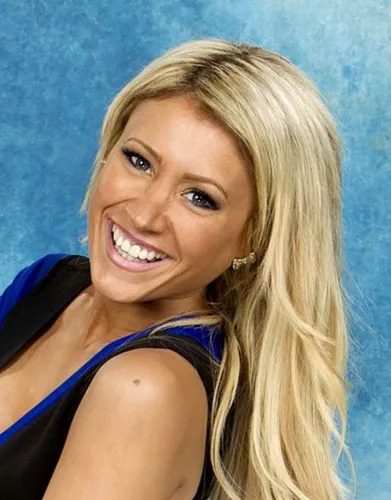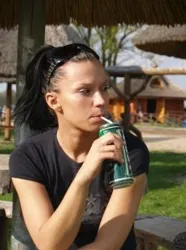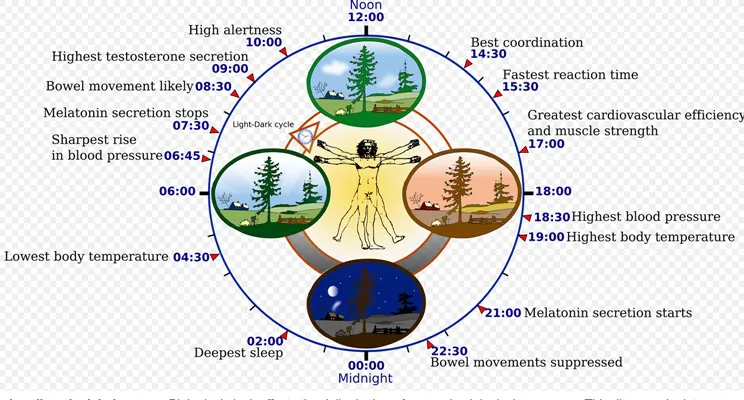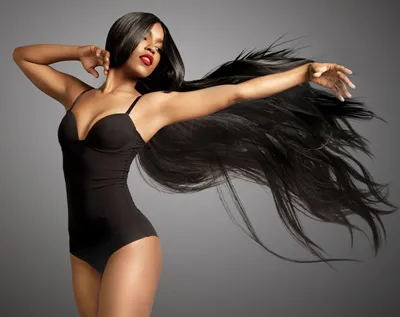
Types Of Hairstyles - Short Definitions
Types Of Hairstyles - Short Definitions
Hairstyles Throughout History
Listed below are some (but definitely not all) of the most popular and widely recognized hairstyles throughout history with short definitions.
Each of the hairstyles usually requires that the hair be cut a certain way to enhance the actual style although it's not always necessary to have the hair cut to adopt a specific hairstyle.
Case in point is the bouffant hairstyle which can be created from more than one hair cut. The key is the length.
Most hairstyles generally require a certain hair type (thin/fine, medium, thick, very thick) and texture (straight, wavy, curly, kinky, very curly) or length (very short to very long) to work properly. All of these considerations should be discussed with your professional hairdresser before adopting a hairstyle.
For more details descriptions visit the HairBoutique.com Hairstyle Glossary.
Afro
This is also known as a "natural" hairstyle. This hairstyle occurs when the natural textured hair grows out naturally and consistently all around. This hairstyle is sometimes popular with African Americans, but can be worn by other races.
The Afro appeared in the 1970s as a specific African American hair fashion statement. Worn prominently by rights activists Angela Davis, it was also popular in the black entertainment fields. The full and natural African American hairstyle was proudly worn by Michael Jackson, Jesse Jackson and other popular entertainment folks.
The style was created with the use of a hair pick designed to maximize the natural kinkiness of black hair. The Afro is remembered as a symbol of black power. Ironically, Samantha on Sex And The City wore an Afro wig in the last season of the popular show to cover hair loss from breast cancer.
Bantu Knots
A combination of twisted plaits and knots. Bantu knots are created by dividing hair into individual plaits,then twisting each plait into knots along the top of the head.
Beatle Mop
This is a hairstyle in the same fashion of the early Beatles. The hair is neatly cut so it can be worn long all around. Generally speaking the Beatle is a form of the popular Bowl cut. When the rock groups the Beatles first came to the United States their floppy mop top hairstyles were quite new. They were common in the UK but not in the US.
Beehive Hairstyle
A hairstyle popularized by Madge Simpson it was a hairstyle that is designed to create major height. The Beehive Hairstyle was created by Margaret Heldt in response to a challenge from a magazine. Margaret used a box as her inspiration.
Bouffant
The bouffant hairdo holds a special place in hair history. The former First Lady of the United States, Jackie Kennedy, started a hairstyle trend by popularizing the bouffant style in the early 1960s. Although the style looked great on the First Lady, it required a lot of prep time with various styling tools such as heavy lacquered hairsprays, teasing combs and gigantic hair rollers.
To achieve the perfect bouffant many women started sleeping on juice can hair rollers and would wrap their heavily teased heads in toilet paper to maintain the shape. The existence of bouffant hairdos actually can be traced back to the 1950s, A popular Life magazine issue wrote a profile about a version of the bouffant hairstyle which was a style worn by aristocratic Europeans.
The bouffant style lost its popularity right after the 1963 assassination of President John F. Kennedy. The "big hair" style became forever linked to the Days of Camelot in the US White House and the high fashion hairstyles and clothing of one of the most glamorous American First Ladies.
Buzz cut
This cut and hairstyle can be worn by men or women but it also referred to as a butch cut. It is created with a clippers and it cut very short all over
Bob
An ear length cut for women, and eventually some men, which first became wildly popular in the 1920s. Louise Brooks was one of the first celebrities to make the Bob wildly popular.
Bowl cut
The idea of a Bowl Cut was that an actual bowl was placed on the head and the hair was cut completely around the ends of the bowl to create a hairstyle that looked like a bowl was placed over the head. The bowl cut was popularized by Moe Howard of The Three Stooges.
Chop
This very short hairstyle is named after chopping off hair in an edgy fashion. It is also known as a crop or even a cap short cut. Chops are usually very short with the cap being the shortest of the group.
Comb over
This is the hairstyle popular with some men used to pull hair over a balding area of the head. It has a derogatory meaning in some references.
Chon mage
This is the name for a samurai's topknot. The hair on the top of the head was usually completely shaved. The rest of the hair was pulled up towards the top of the head and then it was gathered together and wrapped into a topknot. A modified version is still worn today by professional sumo wrestlers.
Cornrows
This is a hairstyle where the tresses are braided tightly in a series of rows. Although it was originally an African hairstyle, it has enjoyed popularity with other races.
Crew cut
A hairstyle very similar to the buzz. The hair cut was originally worn by college boys who were part of the rowing team in the 1900s. The hairstyle was selected so that the rowing team could distinguish themselves from football players, who had long hair which was worn to supplement the inadequate helmets of that time in history.
DA
Stands for "duck's ass" Combed long on sides, parted in back, also called duck-tail or south back. The parting in the back caused the hair to stick up, hence the name.
Devillock
This is a hairstyle which was cut very short in back and on the sides but long in front. Sometimes a big curl was created from the front hair into a long lock.
Dreadlocks
This is a hairstyle where the hair is divided into many long plaits. Tied to Rastafarian hairstyles but different from African American locs or locks which are neatly worn and created.
Flattop
This haircut is cut so that the top of the head is completely flat. The Flattop can be combined with DA and then becomes what is known as a Detroit.
High and tight
This is when the hair is cut or buzzed very short on the sides and back up to the crown where the hair is left longer. It can be a variation of crew cut or flattop. The sides can also be shaved. The High and tight is created with clippers set on certain clipping guards.
Khokhol Chochol, chachol
A Slavic name for a longer tuft of hair left on top or on the front side of the otherwise cleanly shaven or shortly cut man's hair.
Low and tight
A haircut where the hair is cut very short along the sides and back up to a line above the ears but below the crown. The hair is left longer above this line. The sides can be shaven as well. The cut is created with clippers set on a certain guard.
Mohawk
Both sides of the heads are completely shaved with a buzz cut in the middle. Often used meaning "Mohican". There is also what is known as the Faux Hawk which is a modified version of the shaved sides. The key to the Faux Hawk is that the center section of hair running from the forehead to the nape of the neck is thick and full.
Mohican
This is similar to the Mohawk hairstyle. The hair on the sides of the head are shaved or buzzed with the rest of the hair worn longer in the middle.
Mullet
Short on sides, quite long on top. This hairstyle has many variations including a style for women.
Ofuku
This hairstyle is worn by apprentice geisha in their final two years of apprenticeship. Similar to the wareshinobu style. Also called a momo-ware ("split peach") because the bun is split and a red fabric woven in the center.
Pompadour
This hairstyle consists of a wave in the front, named for Madame de Pompadour aristocratic fashion leader of pre-Revolutionary France, mistress of Louis XV of France. Elvis Presley had one. Gwen Stefani has also been known to wear a version of the pompadour and various hair bumps.
Ponytail
Hair is tied back from the face. Ponytails can be created on any hair that is long enough to be tied up and the base of the pony can be positioned at the crown, at the middle of the head or even at the nape of the neck.
Shaven head
Sometimes a completely shaven head may be referred to as "skinhead" as a form of a political statement. Shaven heads have become very popular with certain types of athletic competitors since it's believe that a shaven head is easier for movement. This is true of cyclists and some swimmers as well as body builders.
Short back and sides
This is often known as a "boy's haircut".
Side-locks
A hairstyle popular amongst Orthodox Jews where the peyos or side-locks are allowed to grow long, whilst the rest of the hair is cut.
Tonsure
A haircut where only the crown of the head is completely shaven.
Undercut
Variation of a bowl cut where the sides and back are cut or buzzed very short so that the longer top hair (partially) covers buzzed hair. This style can be modified by shaving the sides.
Wedge
Hairstyle made popular by Dorothy Hamill when she was a popular ice skating competitor. The style was cut in the back to form a wedge of hair that was stacked and fell perfectly into place after shaken.
For more detailed terms visit the HairBoutique.com Hair Glossary located at: http://www.hairboutique.com/glossary/
Social Media Network Information
Please follow us on Twitter at: https://Twitter.com/HairBoutique. I look forward to meeting new people from all walks of Twitter and learning from their Tweets.


